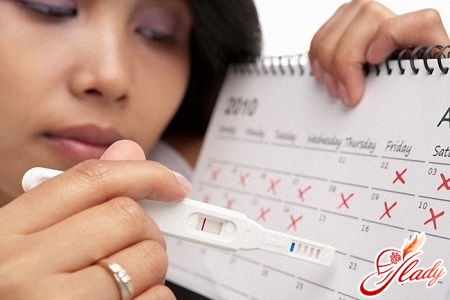 Every woman at least once in her lifeI have encountered such a concept as a delay in menstruation. Sometimes women simply dream of their period being delayed by a couple of days in order to get to this or that event. You have a trip to the sea or a romantic date planned, but these “red days of the calendar” ruin absolutely all your plans! Sounds familiar, doesn’t it? And when your period is really delayed, panic usually sets in. Of course, the first thing almost every woman does is buy a pregnancy test. If the test is positive, everything is crystal clear. If the test is negative, and the woman has a delay in menstruation, there may be other reasons. Don’t panic right away – it may very well be that the woman simply made a mistake in her calculations. Recalculate again and very carefully – by the way, this is the reason why gynecologists do not recommend relying on your memory, but advise keeping a special calendar.
Every woman at least once in her lifeI have encountered such a concept as a delay in menstruation. Sometimes women simply dream of their period being delayed by a couple of days in order to get to this or that event. You have a trip to the sea or a romantic date planned, but these “red days of the calendar” ruin absolutely all your plans! Sounds familiar, doesn’t it? And when your period is really delayed, panic usually sets in. Of course, the first thing almost every woman does is buy a pregnancy test. If the test is positive, everything is crystal clear. If the test is negative, and the woman has a delay in menstruation, there may be other reasons. Don’t panic right away – it may very well be that the woman simply made a mistake in her calculations. Recalculate again and very carefully – by the way, this is the reason why gynecologists do not recommend relying on your memory, but advise keeping a special calendar.
A bit about anatomy
Before talking about the reasons for the delayperiods, it is worth refreshing your memory of what the menstrual cycle is. Knowing the features and details of female physiology and anatomy, it is much easier to understand what exactly can be the reasons for the delay of the menstrual cycle. Moreover, it is worth remembering this very mysterious physiology from top to bottom. Simply put, the primary prerequisites for the formation of a normal process of the menstrual cycle begin in the cerebral cortex. The most important glands responsible for the menstrual cycle are the pituitary gland and the hypothalamus - they are the ones that lead to all sorts of menstrual cycle failures. These glands are directly connected with each other and work synchronously. Disruption of one gland inevitably entails disruption of the other. They secrete special substances that have a direct effect on the functioning of the ovaries and the condition of the uterus. Under the influence of hormones in the first half of the menstrual cycle, the uterus and ovaries gradually prepare for fertilization and implantation of the fertilized egg. The ovaries produce estrogen at an increased rate, the egg matures and is subsequently released. The condition of the uterine mucosa also changes - the endometrium (inner layer) thickens. After ovulation has occurred and the egg has left the follicle, the woman enters the second phase of the menstrual cycle, which is characterized by the following processes: the follicle degenerates into a corpus luteum, which begins to produce progesterone. If conception does not occur, the corpus luteum stops functioning, the inner layer of the uterus is rejected and the woman begins her period. The menstrual cycle is a rather complex process, and, in addition, a finely tuned mechanism, like a Swiss watch. And even the most minor failures and violations can disrupt it. Since the menstrual cycle provides the reproductive function, in various stressful situations the body, aimed at survival, simply switches it off. What is a normal menstrual cycle? First of all, it is characterized by regularity. Although, of course, the duration of the menstrual cycle is individual for each woman - the normal ranges from 21 to 35 days. And moving on to a conversation about what may be the reasons for a delay in menstruation, let's figure out what can be considered a delay. As a rule, gynecologists believe that you should only worry after a five-day delay. And pay attention to the fact that absolutely any woman, even a completely healthy one, can have a delay in menstruation several times a year. However, if you notice delays more than three times a year, you should think about the need to visit a doctor - these failures can indicate the presence of a variety of problems in a woman's fragile body.
Causes of menstrual irregularities
So, we have smoothly approached the main topic.today's conversation is about the reasons that can lead to a delay in menstruation. There are quite a few such reasons - and each of them is worthy of attention. Below we will describe each of them in more detail.
- Different stress situations
In the event that for one reason or anothera woman is in a state of constant stress, the probability of a delay in menstruation increases several times. The cause of such stressful conditions can be a variety of factors - problems in the family or at work, exams, death or serious illness of loved ones and relatives, and many other events. Therefore, if a delay in menstruation occurs against such a psychological background, a woman must tell her doctor - a gynecologist about it. By the way, this group also includes chronic infection syndrome and constant lack of sleep. Therefore, you should not complicate your life with another problem in the form of a delay in menstruation - it is much more reasonable to try to be as nervous as possible, and if for some reason you cannot cope with the problem on your own, you need to consult a doctor - a neurologist or a psychologist. If necessary, the doctor will prescribe you certain sedatives that will help stabilize the emotional and psychological background of the woman.
- Body weight of a woman
Not the least role in normal menstruationThe woman's body weight also plays a role in the cycle. If it is too excessive or, on the contrary, too low, the risk of disruption of the normal menstrual cycle increases several times. And this fact has a scientific explanation. Subcutaneous fat in the female body very actively produces female hormones, estrogens. And accordingly, adipose tissue plays a far from insignificant role in the regulation of the menstrual cycle. That is why too much excess body weight will sooner or later inevitably lead to the fact that too much estrogens will be produced, which means that a failure in the woman's menstrual cycle will occur. And the general health of a woman who is too overweight also suffers no less. And the pursuit of the almost unattainable "90-60-90" standard, which is so fashionable among women, and especially among young girls, can also turn out to be very deplorable. Numerous scientific studies have reliably confirmed that the minimum weight of a healthy woman should be at least 50 kilograms. In the same case, if the weight is less than this critical mark, you can not only face delays, but also say goodbye to the menstrual cycle for a very long time. Of course, this does not mean that diets should be completely excluded. However, we must not forget that in any case, nutrition should be carefully balanced - do not forget about the required amount of proteins, fats and carbohydrates. In addition, a full range of microelements and vitamins is necessary.
- Too much exercise
Of course, regular fitness classes ormorning jogging will not bring any benefit to women's health. But excessive, exhausting loads on the body - professional sports, heavy physical exercise, with a very high degree of probability can lead to a delay in menstruation.
- Various diseases of internal organs
As has been said many times, menstrualthe cycle directly depends on the general condition of the body. If a woman has certain chronic diseases, she may also experience a delay in menstruation. Most often, the culprits of menstrual cycle disorders are diseases such as endometritis, endometriosis, salpingo-oophoritis, uterine and appendage lesions, and ovarian dysfunction.
- Emergency Contraception
In approximately 10% of all cases of delaymenstrual cycle is caused by emergency contraception - the use of such drugs as, for example, "Postinor". Of course, such a measure is much better than terminating an unplanned pregnancy. However, you should not get too carried away - otherwise your health may suffer very seriously.
- Medications
There are a number of pharmacologicalmedications, the use of which can lead to such a side effect as menstrual irregularities. Antidepressants, diuretics, tuberculosis medications, antiulcer drugs - all of them can lead to menstrual irregularities. If you regularly take any medications, tell your doctor about your problem.
- Radical change of climate
In the event that a woman changes climate abruptly,the risk that she will have a delay in menstruation increases approximately three times. This is why gynecologists so vehemently protest against vacations in hot countries in the winter. Not only does a woman face acclimatization upon arriving on vacation, but her period does not start on time. The woman begins to worry, not even realizing that the absence of menstruation is a kind of price for the vacation. Unfortunately, many women are very careless about their health. The cherished date: no period. The woman goes to the pharmacy, buys one test, a second, a third - no pregnancy. The woman calms down and does not go to the doctor. And this delay is very expensive - the disorder that led to the delay in menstruation continues to worsen. And as a result, a serious chronic disease can develop. Therefore, the reasons for the delay in menstruation, other than pregnancy, must be established. We recommend reading:









